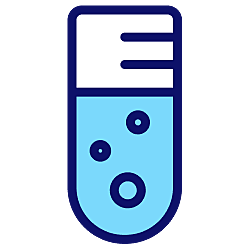PCOS Test
A polycystic ovary syndrome (PCOS) test is a blood test that measures your levels of testosterone and sex hormone binding globulin (SHBG).






-
Polycystic ovarian syndrome (PCOS) is a condition that can affect fertility in women. PCOS is due to an imbalance of hormones caused by the ovaries releasing androgens.
If you have PCOS, your ovaries are not able to release an egg during your regular menstrual cycle. This can lead to difficulties in getting pregnant.
A doctor may recommend you do a PCOS test if you have irregular periods and are having trouble conceiving.



About PCOS test
-
-
A polycystic ovary syndrome test will check for your levels of testosterone and sex hormone binding globulin (SHBG).
SHBG is a protein that carries hormones like testosterone and oestrogen. Testosterone is a type of androgen (male sex hormone).
If you have PCOS, your levels of androgens are likely to be higher than normal.
Both men and women produce androgens, but men produce these hormones around 10 times more than women. In women, testosterone and other androgens are produced by the ovaries and adrenal glands.
Androgens are important in maintaining several of your body’s functions, including:
- emotional wellbeing
- sex drive (libido)
- body hair growth
- bone strength
If you have PCOS, you may have higher levels of androgens. Excess androgens can lead to symptoms such as increased body hair growth, irregular periods and difficulties in getting pregnant.
-
-
A PCOS test is accurate in testing for specific hormone levels. Our test samples are sent to our UK based accredited lab partner.
Remember that a test result cannot tell you if you have PCOS. Instead, your doctor will take into account your symptoms, general health and any other test results. They will consider the wider picture of your health before giving a diagnosis of PCOS.
You may need to do a PCOS test more than once. You might also need other medical examinations to confirm a diagnosis of PCOS, such as an ultrasound scan of your ovaries.
-
-
You should take a PCOS test if you have the symptoms of PCOS, such as irregular periods, and are struggling to get pregnant. You can also do the PCOS test if you do not have any symptoms and are finding it difficult to get pregnant.
It’s best to take the PCOS test first thing in the morning. Your hormones will fluctuate throughout the day but will normally be at their peak levels in the morning.
There are other female fertility tests that you may want to consider including:
- AMH test
- progesterone test
- pituitary profile test
-
-
A PCOS test will check for your levels of testosterone and sex hormone binding globulin (SHBG). These values are used to calculate a ratio called your free androgen index (FAI).
SHBG is a protein found in your blood that binds to androgens like testosterone or dihydrotestosterone (DHT), as well as oestrogen. SHBG controls how much testosterone your body has access to.
If your SHBG level is low, this means there is more free testosterone circulating in your body. Your cells can use this free testosterone, which can lead to the symptoms of PCOS.
-
-
You will get 3 results after completing your PCOS test. These are your:
- testosterone levels
- sex hormone binding globulin (SHBG) levels
- free androgen index (FAI) value
For women between 20 to 50 years old, the normal free androgen index (FAI) value is less than 5. This can vary depending on if you have any other health conditions.
One of our doctors at ZAVA will guide you through the next steps once you get your results. If your test results come back with an FAI higher than 5, this does not mean you definitely have PCOS. A doctor will consider your test results and your symptoms before giving a diagnosis.
Your test results will be sent to your confidential ZAVA account. Your results will not be shared with anyone else.
-
-
Polycystic ovarian syndrome is a condition that affects how your ovaries work. This can impact your periods, how you release eggs and ultimately your fertility.
Your ovaries are controlled by different hormones. These include follicle-stimulating hormone (FSH) and luteinizing hormone (LH). These hormones are made in a part of your brain called the pituitary gland.
You need these hormones to ovulate properly and have periods. Other fertility tests can check if your FSH and LH levels are within range.
Ovulation occurs when your ovaries release an egg in preparation to be fertilised by sperm. FSH is needed to stimulate the development of an egg inside your ovaries. FSH also allows oestrogen to be released from your ovaries.
When there’s enough oestrogen in your blood, this triggers an LH surge. This increase in LH levels causes your ovaries to release an egg.
If you have PCOS, you may have a high level of testosterone. Too much testosterone in women can stop the process of ovulation.
In PCOS, your ovaries will contain multiple sacs, or cysts, of under-developed eggs. These eggs will not be released as they are not developed, which means you may have irregular periods.
PCOS can also put you at risk of having other health conditions, such as high blood pressure, high cholesterol levels and heart disease.
PCOS can also increase your risk of getting type 2 diabetes as you’re more likely to be insulin resistant. Being insulin resistant means your body can make insulin but your cells have difficulty in using it to maintain a steady blood sugar level.
-
-
The symptoms of PCOS include:
- irregular periods
- excess hair growth (hirsutism)
- weight gain
- acne
You may also experience heavy bleeding when you do have your periods. This is because the lining of your womb will continue to thicken in the absence of having a period. When you eventually have a period, the thickened lining will break down and give you a heavier flow.
These symptoms can also be triggered by an increase in male sex hormones, also known as androgens. Having androgen excess is also called hyperandrogenism. If you have androgen excess this does not mean you necessarily have PCOS.
Some symptoms of PCOS can overlap with symptoms of other health conditions. For example, having irregular periods can be a sign of hypothyroidism. You can request a thyroid hormone levels test kit at ZAVA. This includes checking for thyroid-stimulating hormone (TSH).
-
-
PCOS affects fertility as your eggs remain in follicles inside your ovaries and do not develop. This means you will ovulate less than once a month.
As you ovulate less, it’s difficult to predict when you are in your peak fertility window. It’s also less likely that a sperm will fertilise your egg as you may not ovulate for several months.

Dr Babak Ashrafi Clinical Lead for Service Expansion
Accreditations: BSc, MBBS, MRCGP (2008)
Babak studied medicine at King’s College London and graduated in 2003, having also gained a bachelor’s degree in Physiology during his time there. He completed his general practice (GP) training in East London, where he worked for a number of years as a partner at a large inner-city GP practice. He completed the Royal College of GPs membership exam in 2007.
Meet our doctorsLast reviewed: 29 Mar 2022
-
Polycystic Ovaries Syndrome (Healthline) [April 2021] [accessed March 2022]
-
Polycystic ovary syndrome, NICE Guidance [accessed March 2022]
-
Hormone levels and PCOS [accessed March 2022]
-
Polycystic ovary syndrome, National Health Service [accessed March 2022]
-
Polycystic ovary syndrome, MayoClinic [accessed March 2022]








